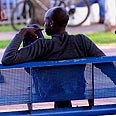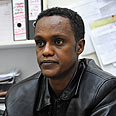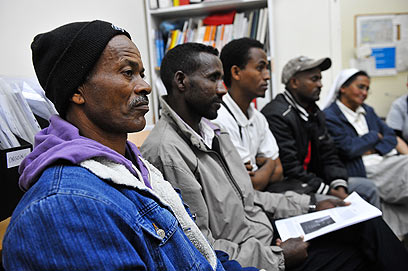

The government has recently tightened regulations on asylum seekers, promising to strictly enforce the law forbidding Israeli businesses to hire individuals without a work permit.
"The Israeli public thinks that we are dangerous criminals who only drink alcohol and steal, but the reality is completely different," said Haile Mengistem, a lawyer who arrived in Israel from Eritrea a month ago. "We'll be unified and demand our rights."
The first-of-a-kind migrant association has met for the first time this week to discuss a rally its members plan to hold in the upcoming weeks.
"I haven't been able to find work for six months already, and the situation gets harder every day," said one participant, who has been in Israel for the past three years. "We help each other within the community, but now more and more people are losing their jobs, and there are almost no people who work and can help with the food.
He described a harsh reality. "We live in studio apartments, 13 people in each one, and now we won't be able to afford this, either," he said. "In the place where I live, for example, only three people work and it's very difficult. We live in fear from the future, and this makes a lot of people very depressed."
'Landlord disconnected my electricity'
The only woman to attend the union's gathering, a Bnei Brak resident who came to Israel three years ago, was recently served a sudden eviction notice. "Even though I have signed a lease, the apartment owner called and told me I have to leave in four days," she said. "I told him that I can't, so he turned off the electricity. I don't have a refrigerator. I'm really scared of the dark at night, and now it has gotten cold, too.
"Now he has let me stay until the end of the month," she added. "I really don't know where I will go and what I will do."
According to Mengistem, the immigrants' union focuses on the legal aspect of their circumstances. "We are refugees," he said. "To live in our country is dangerous and we came here knowing that Israel is a democratic state that will protect us. In reality, the people here are living in poverty and shameful conditions.
"If the situation persists, it will cause all kinds of unwanted side effects, like violence and alcoholism," he added.

Refugees at a Jaffa clinic (Photo: Ben Kelmer)
Mengistem defined two goals for the union: To attain legal rights and receive visas that will allow the immigrants to work and live in dignity.
"There's crime in our community – but it's natural, it exists in every community, even among Israelis," Mengistem said. "I want to cooperate with the police. As a community we will take care of it, and if necessary we will turn in (criminals) to the police."
'Uncertainty deteriorates migrants' health'
Meanwhile, doctors working at a Jaffa clinic run by the Physicians for Human Rights organization claim that the migrants' uncertain future severely affects their health. According to clinic's data, 42% of the people who arrived at the clinic over the past month were first time patients, comparing to the 38% in October and 29% in September.
"People lose their jobs, lose their health insurance, and turn to us," said the clinic's intervention coordinator, Shahar Shoham. "There are those who go live on the street, and that doesn't contribute to their health. These people escaped their country, and here they can't work, which is demoralizing and frustrating."
Yet another factor distressing the migrants is the language barrier, which prevents them from following their own fate on the news.
"The refugees have no way to obtain accurate information, and they find themselves in a type of vacuum," said Aziz, a nun who aids the refugees. "They don’t read newspapers or watch television. I always get phone calls from scared individuals asking if I know what is going on."
- Follow Ynetnews on Facebook















